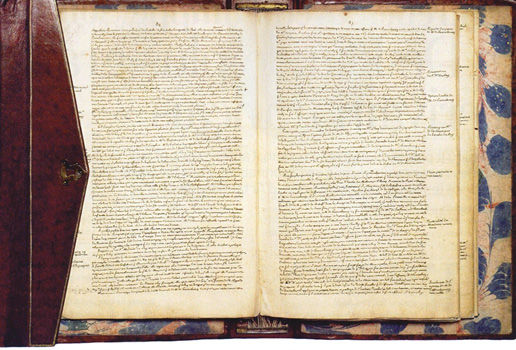52. Louis de Rouvroy, Duc de Saint-Simon (1675-1755), Memoirs, posthumous83
Louis de Rouvroy, Duc de Saint-Simon, retired to his estates to write his famous Memoirs. Here he returns to the tragic episode of the Revocation of the Edict of Nantes. This edict, brought in by the peacemaker King Henri IV, in 1598, had heralded the end of thirty years of religious war in France, making it possible for Protestants (also known as Huguenots) to worship as they pleased. Louis XIV revoked it in 1685 and in so doing plunged France into a period of terrible repression, causing a wave of forced conversions and also a mass exodus of Protestants from France. What Saint-Simon writes here was not published until long after his death.

A spread from the autograph manuscript of Mémoires de Louis, duc de Saint Simon: https://commons.wikimedia.org/wiki/File:Manuscrit_autographe_des_Mémoires_du_duc_de_Saint_Simon.jpg
The king had embraced piety of an utterly ignorant sort. Political strategy grafted itself onto this piety. People tried to curry favour by touching on his most sensitive points, that is, piety and power. The Huguenots were painted in the blackest colours: he was told they had a state within the state, that it had descended into unbridled licentiousness after years of public disorder, rebellion, civil war, foreign alliances, and even open resistance to the kings his predecessors. They told him he’d be reduced to negotiating terms with them. […]
The revocation of the Edict of Nantes without the slightest pretext or need of any sort, along with the various prohibitions rather than declarations which then followed it, were the fruits of this atrocious intriguing, and it depopulated a quarter of the kingdom, destroyed its trade, weakened it at every level, subjected it to the overt and public pillaging on the part of the dragoons, authorised sufferings and torture during the course of which many thousands of innocents of both sexes actually perished. It ruined a populous country, tore a world of families apart, set relatives against each other for gain, leaving the dispossessed to die of hunger. It forced our manufacturing trades to go abroad, enabling foreign states to flourish and thrive at the expense of ours and providing them with the wealth to build new towns. It showed the world the spectacle of a remarkable people suddenly outlawed, naked, fugitive, wandering blameless, seeking shelter far from home, sentencing noblemen, the wealthy, the aged, people often highly respected for their piety, knowledge, and virtue, people whose easy lives had made them weak and delicate, to the galleys, where they found themselves under the all too effective whip of the tribunal. And all because of their religion. As a crowning horror, it filled every corner of the kingdom with sacrilegious oaths of allegiance which struggled to be heard over the resounding screams of the unfortunate victims of error, with countless people sacrificing their conscience to save their belongings and their peace, paying for them with fake abjurations from which they were instantly dragged to worship what they didn’t believe in the slightest, truly receiving the divine body of the Holiest of holies, whilst remaining convinced the whole time that it was only bread and that they should continue to abhor it. This was the general abomination to which flattery and cruelty together gave birth. From torture to abjuration and thence to communion was often the work of under twenty-four hours, and their tormentors were both their guides and their witnesses. […]
The king was kept informed on all sides about the details of all this persecution and conversion. The numbers of those who had abjured and received communion were counted in their thousands: two thousand from one place, six thousand in another, all at once, in an instant. The king congratulated himself on his power and his piety. He thought he was living at a time when the apostles were spreading the word, and that it was all thanks to himself. Bishops wrote panegyrics in his praise. Jesuits made their pulpits and missions resounded with it. The whole of France was filled with horror and disarray, yet never has so much triumph and joy been expressed, never has so much praise been voiced. The monarch was in no doubt about the sincerity of this host of conversions: the converters took great care to convince him of it and to sanctify it in advance. He swallowed this poison in deep draughts. He thought he was greater in the sight of men than he had ever been, and that he had made better progress in atoning for his sins and for his scandalous life, and approached closer to God. He heard nothing but praise, whilst all the time in their hearts the good true Catholics and the holy bishops wept and shuddered.
Read and download the free original text online (facsimile), 1858 edition: https://ia802604.us.archive.org/29/items/mmoirescomplet11sainrich/mmoirescomplet11sainrich_bw.pdf
Read the free original text online (facsimile), 1856 edition: https://books.google.co.uk/books?id=bJhTAAAAcAAJ&pg=PA37
83 Louis de Rouvroy, Duc de Saint-Simon, Mémoires, Paris: Hachette, 1858.







